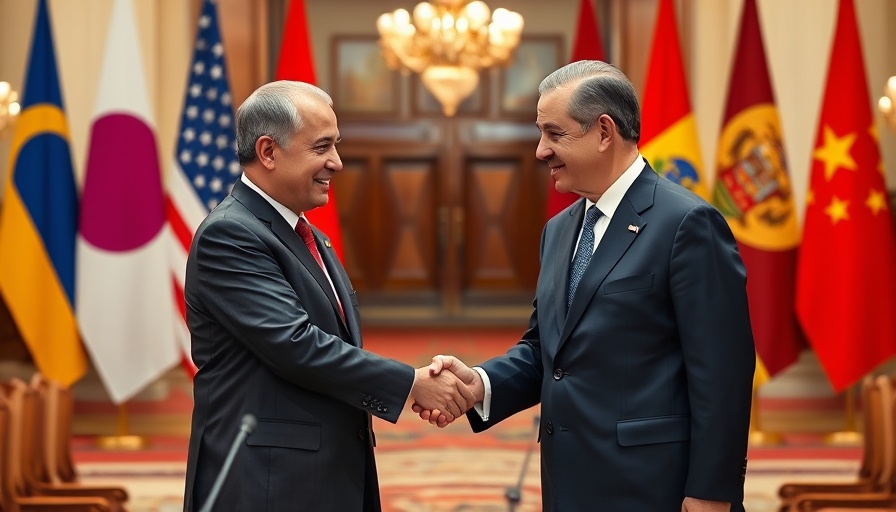
Nuclear Cooperation: A New Era for Mali and Russia?
In a significant move towards strengthening their bilateral relations, Mali and Russia signed a series of agreements focused largely on economic and military cooperation, including a notable deal on nuclear energy during the recent official visit of Mali's interim President Assimi Goita to Moscow. Despite the modest trade turnover currently observed, both leaders expressed optimism about a robust trajectory for future collaboration.
In 'Mali and Russia sign deal on nuclear energy during Goïta's Moscow visit,' the discussion dives into the increasing cooperation between Mali and Russia, exploring key insights that sparked deeper analysis on our end.
The Emerging Role of Russia in African Geopolitics
Mali's pivot towards Russia comes amidst increasing insecurity and instability in the region, primarily due to the ongoing threat posed by jihadist groups. With attacks on military facilities escalating, African countries, particularly the Sahel states, are exploring partnerships with global powers like Russia to fortify their military capabilities. The recent withdrawal of the paramilitary group Wagner from Mali and its subsequent replacement by the Africa Corps—the Russian government's military personnel—signals a shift towards integrating Russian military assistance into local counterinsurgency efforts. This growing dependence raises questions about the implications for Mali’s sovereignty and the long-term strategy behind such partnerships.
Geological Exploration and Resource Development: Economic Implications
The agreements reached in Moscow are wideranging, embracing not just military collaboration but also crucial sectors like geological exploration and the development of natural resources. Russia's experience and technological advancements in these industries could play a pivotal role in enhancing Mali's economic landscape, which has long been hampered by political insecurity and operational challenges. If effectively harnessed, these resources could catalyze economic growth and initiate a pathway towards a more resilient and self-sustaining economy.
Logistics and Humanitarian Considerations: A Multi-Faceted Approach
Beyond energy and military cooperation, the discussions covered logistics and humanitarian efforts, acknowledging the complex nature of Mali's current environment. The inclusion of logistic operations indicates an understanding of the vital need for infrastructure development as a backbone for economic stability. This aligns with global trends where infrastructure investment is increasingly recognized as a driver of economic transformation in developing nations.
Critiques and Counterarguments: Databases of Scrutiny
While the agreements appear promising, analysts suggest that deeper scrutiny is warranted. Critics of Russian engagements in Africa highlight potential risks of neocolonialism, where resource-rich nations in Africa may trade one form of colonial control for another. The past experiences of states that have engaged heavily with foreign powers under similar circumstances raise concerns about the actual benefit derived from such partnerships. A balanced discourse is crucial to ascertain whether African nations, including Mali, are indeed making empowered decisions or falling prey to geopolitical machinations.
The Broader African Context: Trends in International Relations
Mali's strategic agreements with Russia are reflective of a broader trend where African nations are diversifying their international ties, moving away from traditional Western alliances. With current global dynamics shifting towards multipolarity, countries within the continent are exploring relationships that align more closely with their immediate interests and security requirements. This realignment of relationships can be viewed as a radical shift towards an independent African diplomatic and economic model.
Russia’s commitment to enhancing its presence in Africa, evidenced by President Putin’s previous statements on nurturing economic and military cooperation across the continent, suggests that these agreements may serve as a model for other nations looking to bolster their positions. As nations like Mali engage in these transformative partnerships, the potential for redefining power dynamics within Africa becomes increasingly evident.
Conclusion: The Road Ahead for Mali and Russia
The agreements signed during President Goita's visit to Moscow represent a critical juncture for Mali, as it seeks to navigate turbulent waters both economically and politically. The cooperation deal on nuclear energy and broader military and resource cooperation indicates a burgeoning relationship that could reshape Mali’s future. However, the implications of this partnership must be examined through a critical lens, ensuring that the sovereignty and interests of the Malian people remain paramount. Monitoring the unfolding dynamics of this relationship will be essential as both nations embark on this daunting yet potentially rewarding journey.
As we observe the evolving landscape of African geopolitics and international collaborations, staying informed about future agreements and developments will be vital for understanding the implications of these strategic choices.
 Add Row
Add Row  Add
Add 




Write A Comment